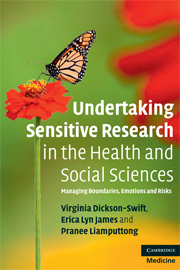 Undertaking Sensitive Research in the Health and Social Sciences
Undertaking Sensitive Research in the Health and Social Sciences Book contents
- Frontmatter
- Contents
- Preface
- Acknowledgements
- About the authors
- 1 What is sensitive research?
- 2 Doing sensitive research: methodological, theoretical, ethical and moral perspectives
- 3 Conducting a sensitive research project
- 4 Managing boundaries in sensitive research
- 5 Emotions and sensitive research
- 6 Managing risks and ethics in research
- 7 Implications and recommendations for researchers
- References
- Index
- References
3 - Conducting a sensitive research project
Published online by Cambridge University Press: 11 September 2009
- Frontmatter
- Contents
- Preface
- Acknowledgements
- About the authors
- 1 What is sensitive research?
- 2 Doing sensitive research: methodological, theoretical, ethical and moral perspectives
- 3 Conducting a sensitive research project
- 4 Managing boundaries in sensitive research
- 5 Emotions and sensitive research
- 6 Managing risks and ethics in research
- 7 Implications and recommendations for researchers
- References
- Index
- References
Summary
Data collection can be an intense experience, especially if the topic that one has chosen has to do with the illness experience or other stressful human experiences. The stories that the qualitative researcher obtains in interviews will be stories of intense suffering, social injustices, or other things that will shock the researcher.
(Morse & Field, 1995:78)In this chapter we discuss the conduct and process of undertaking qualitative research on sensitive topics and raise some important points for researchers to consider throughout the research process. There are a number of specific issues regarding the process of entering people's lives for research purposes. These include rapport development, researcher self-disclosure, listening to untold stories, feelings of guilt and vulnerability, leaving the research relationship and researcher exhaustion. Data transcription and analysis are important phases in the qualitative research process and often require an enormous time commitment from researchers. In this chapter we will outline some of the difficulties faced by researchers from the time they enter into the lives of their participants through to data collection, transcription and analysis.
Entering the lives of others
In an examination of the experience of undertaking sensitive health research, it is important to first consider what it is that we, as qualitative researchers, actually do. We go into other people's lives, sometimes at a time of crisis and stress, and we ask them to talk in detail about their experiences (Cannon, 1992; Glesne & Peshkin, 1992; Liamputtong, 2007; Liamputtong & Ezzy, 2005; Morse & Field, 1995; Ribbens & Edwards, 1998).
- Type
- Chapter
- Information
- Undertaking Sensitive Research in the Health and Social SciencesManaging Boundaries, Emotions and Risks, pp. 33 - 54Publisher: Cambridge University PressPrint publication year: 2008


